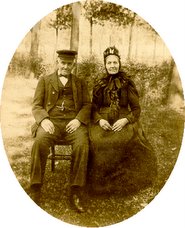Both Bruges and Ghent have glorious - but also blood drenched - histories. From the early Middle Ages on, they were among the main European commercial hives and centers of culture and arts.
Both Bruges and Ghent whittered away from the sixteenth to the nineteenth century. Decay started with the wars of religion, when a large part of the educated classes, converted to protestantism, fled to the Netherlands and other havens of tolerance, and when a large part of the priceless art treasures of previous ages were destroyed. Society was almost decapitate
Ghent had a major industrial revival after one of its most famous sons, Lieven Bauwens, an industrial spy, brought a spinning mule and skilled workers from England to the European continent (Paris and Ghent) late in the 18th century. The guy - who if my memory serves me right was condemned to death in England - became a leading industrialist.
The new industrial "élite" born out of the development of the textile industry tore down a large part of the historical city to build plants, big houses for themselves and slum dwellings for the working class.
Bruges had "no such luck" ; the city remained largely untouched and most of its population lived in abject poverty until the development of the tourist industry, when its old city center became its main trump card.
And Ghent continued to demolish its patrimonium - I remember a couple of scandals during my student years, and even more recently. It is not so long ago, three or four decades at the most, that Ghent has come to understand the importance of its patrimonium.
Both cities had their problems, their hours of glory and decay. No reason to start another quarrel.
But cooperation ... that runs against centuries of quarrels and fights.
skip to main |
skip to sidebar


but I'd like to know him better still





This blog offers a mixture of genealogy, confused contrarian ideas and selected b*y ruminations.
Pablo Carpintero
- Pablo Carpintero
- your devoted servant, is a happily retired economist, and way too old to mend his ways. Pablo knows that many economists have the perfidious tendency to turn into professional idiots. That's why his rule of life is to be as contrarian as possible, and then some ...
A recent picture of me ...

A guy I have known for almost 70 years

but I'd like to know him better still
Economists ...
who take themselves too seriously tend to be dangerous people. Therefore see http://netec.mcc.ac.uk/JokEc.html, the perfect antidose - whenever the link works ...
Contrarian ?
"WHENEVER YOU FIND YOURSELF ON THE SIDE OF THE MAJORITY, IT IS TIME TO PAUSE AND REFLECT. "
(Marc Twain)
(Marc Twain)
Genealogy

is a passion, not a hobby.
This blog
is dedicated to most of my nieces who think genealogy is a total loss of time. It is also dedicated to the one who protests she never said that and who helped me develop this blog.
Sites I "dig"
Kan het echt ?

Blog Archive
-
▼
2009
(962)
-
▼
August
(113)
- Niets nieuws onder de zon
- Church latin
- Warning
- Imago
- Onafhankelijkheid
- Terug naar school
- Italy
- Banksters en graaiers
- August 29 2005
- Ik word het moe, doodmoe ...
- Système paraplu
- Statistiek van de waanzin
- Tante Post
- Globalisering
- Welvaartseconomie
- Bouwen in Flaanderen
- Kwaliteitslabel
- Spieken en klikken
- Tijdrekening ...
- Illegaal pokeren
- Sixty-five years ago
- Electrabel
- Plastiek
- Het graf van Marilyn
- Begrafenis
- Solo op dertien
- Ver over
- Remmen
- Crisis
- Vlaanderen mag Brussel loslaten
- Integratie
- Opel Antwerpen
- Het is te laat de put gevuld ...
- Business is business
- Economie aan de beterhand ?
- Customer satisfaction
- Customers
- Mobiel bellen
- Melkkoe
- VT4 en VijfTV
- Mensenhandel
- Berichtgeving
- Horeca
- Markt en farma
- Moh ven toh
- Don Quichote
- Even ernstig
- Experts
- Hygiëne
- Symptomen
- Pieje Kallier
- Taxi
- Bruges and Ghent (2)
- Bruges and Ghent
- Orgaantransplantatie
- Belgostalgicist
- Reizen
- Hugh Grant
- Geluidsoverlast
- Banksters and losers
- Smile ... or else
- Lekken
- Westerschelde
- Meeting the parents
- Crying wolf once too often
- Zo ver is het nu gekomen
- Assumption
- Villa Hellebosch
- Belgisch
- Schaamteloos
- Spookschip
- Telenet
- Kabul
- Marktconform
- De alwetende
- Big brother
- Foetsie (4)
- Modern mass
- Mass of yore
- Foetsie (3)
- Taliban
- Lekken
- Traders
- Wijze raad
- Een zwarte dag
- Griep
- Islamisering van Europa
- Foetsie (2)
- Grondig mis
- Multiculturalisme
- Schuldklok
- Boontje komt om zijn loontje ?
- A thought
- Chinese statistics
- Huren
- Marilyn
- The recession is not over
- Foetsie
- August 4 1914
-
▼
August
(113)
Een knipoog ...


Labels
- "those were the days" (37)
- Appelmans (8)
- Arnou (1)
- art (25)
- Asselman (29)
- b*y comments (423)
- Baetens (3)
- Baeyens (3)
- banking (74)
- Baveghems (14)
- Beeckman (6)
- Belgium (301)
- Bellemans (5)
- blogging (9)
- Booms (3)
- Borluut (1)
- Borremans (5)
- Bosch (1)
- Boschmans (1)
- Broeckaert (37)
- Brouckmans (1)
- Buydens (1)
- Callebaut (1)
- Cammaerts (2)
- Canuel (2)
- Charlemagne (1)
- Clement (2)
- Cobbaert (5)
- contrarian comments (2272)
- contrarian joke (136)
- Covens (21)
- crime (40)
- criminals (25)
- Cromphaut (1)
- cycling (29)
- D'Hauwer (2)
- De Beer (9)
- De Boeck (3)
- De Brabander (5)
- De Buttere (2)
- De Clerck (2)
- De Colins (16)
- De Cooman (2)
- De Cuyper (5)
- De Dier (14)
- De Dobbeleer (1)
- De Doncker (12)
- De Fru (1)
- De Kerpel (2)
- de la Torre (1)
- De Leeuw (9)
- De Masmines (1)
- De Meyere (3)
- De Mol (12)
- De Moor (2)
- De Quick (1)
- De Raeymaecker (1)
- De Ridder (3)
- De Ro (6)
- De Schepper (26)
- De Schrevel (4)
- De Trooster (2)
- De Troyer (4)
- De Vidts (126)
- De Vleeschauwer (8)
- De Vleeshouwer (3)
- De Vleminck (6)
- De Volder (1)
- De Winne (17)
- death (5)
- development aid (4)
- Dilbert (1)
- Du Mongh (3)
- east and west (2)
- economy (600)
- environment (86)
- EU (73)
- Europe (2)
- Evenepoel (8)
- Eylenbosch (3)
- family (566)
- farmers (2)
- Felix (3)
- finance (462)
- Flanders fields (2)
- folk lore (6)
- food (52)
- France (33)
- fundamentalism (7)
- Galmaert (14)
- Gansemans (8)
- Geeroms (4)
- genealogy (112)
- general comments (221)
- Gent (11)
- Gilleijns (1)
- Gillis (1)
- Gillisjans (1)
- Goessens (12)
- Goossens (33)
- Goutswilders (2)
- greed (514)
- Grijseels (3)
- Grimbergen (1)
- Gryseels (1)
- Guns (18)
- Haeckmans (1)
- health (94)
- Heerenhoudt (1)
- history (158)
- Huylenbroeck (15)
- In paradisum (4)
- Ingelbeens (1)
- islam (88)
- Janssens (14)
- Jespers (9)
- Kestens (6)
- Klein (2)
- labels (3)
- Lambeen (5)
- Lauwerijs (3)
- Leus (3)
- Lievens (13)
- Lindemans (1)
- literature (6)
- local history (141)
- Lourdes (8)
- management (43)
- Mattens (1)
- Matthijs (2)
- Meerte (1)
- Meganck (18)
- meisenier (2)
- Mennens (1)
- Menschaert (5)
- Mertens (1)
- money (12)
- morons (62)
- Mottemans (6)
- multiculturalism (152)
- multinationals (20)
- music (85)
- Muylaert (37)
- Muylaerts (1)
- Myanmar (7)
- Mylief (1)
- Nero (1)
- Neukermans (102)
- Ninove (3)
- notorious (3)
- old age (8)
- Oradour (3)
- Paridaens (8)
- Peelman (1)
- Peron (3)
- Pierens (2)
- Pipenpoy (11)
- Piret (1)
- political correctness (1933)
- price level (43)
- professional life (14)
- Pyrenees (1)
- racism (8)
- Ravijst (28)
- relativism (9)
- religion (410)
- Renneboog (7)
- Reybosch (3)
- Reymers (1)
- Russia (1)
- sarcasm (251)
- Schandevijl (6)
- Schets (2)
- Schoenmaeckers (2)
- Schouppe (3)
- sConinckx (3)
- Simpsons (3)
- Smeyers (2)
- Sneppe (3)
- Snoeck (2)
- society (1929)
- Sonck (2)
- sport (18)
- statistics (161)
- Sterckx (17)
- Stockmans (12)
- Straetman (12)
- stupidity (15)
- Swaef (2)
- Taelman (4)
- taxes (10)
- terrorism (8)
- tertio (43)
- Thienpont (6)
- Timmermans (74)
- Tolkien (1)
- tourism (43)
- transport (97)
- travel (86)
- TV (63)
- Twain (1)
- Umbria (2)
- USA (166)
- USD (4)
- Van Abcoude (2)
- Van Boterdael (2)
- Van Brabant (1)
- Van Caulaert (1)
- Van Cauwelaert (12)
- Van Cutsem (9)
- Van de Maele (1)
- Van de Perre (19)
- Van de Sype (1)
- Van de Voorde (2)
- Van den Berghe (5)
- Van den Borre (1)
- Van den Bossche (1)
- Van den Hauwe (1)
- Van den Heuvel (2)
- Van den Houte (17)
- Van den Waterloop (14)
- Van der Burcht (1)
- Van der Haegen (3)
- Van der Heyden (3)
- Van der Kelen (11)
- Van der Meeren (3)
- Van der Poorten (1)
- Van der Sleyen (49)
- Van der Smessen (1)
- Van der Speeten (28)
- Van der Straeten (8)
- Van Duest (3)
- Van Eeckhoudt (21)
- Van Eesbeke (8)
- Van Gaesbeke (1)
- Van Gavere (4)
- Van Geet (1)
- Van Heetvelde (2)
- Van Kesterbeke (2)
- Van Laethem (2)
- Van Leefdaal (6)
- Van Lierde (29)
- Van Londerzele (4)
- Van Massemen (1)
- Van Molenbeke (1)
- Van Muylem (9)
- Van Nieuwenhove (12)
- Van Oudenhove (1)
- Van Overstraeten (10)
- Van Poucke (4)
- Van Snick (1)
- Van Stalle (2)
- Van Testel (3)
- Van Tricht (17)
- Van Zottegem (1)
- Velghe (1)
- Venneman (4)
- Verheyen (1)
- Verhoeven (1)
- Vernaillen (27)
- Vetsuypens (1)
- Vijdt (1)
- Vlaeminck (26)
- Waegeman (2)
- Waije (3)
- Walckiers (8)
- Walravens (17)
- war (98)
- Wellekens (4)
- Wijns (2)
- Wynant (16)

Ybbiayf
after all those years
still the first on the web ?
still the first on the web ?
No comments:
Post a Comment